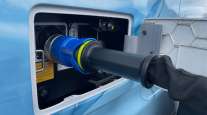Senior Reporter
Fed Policymakers Unveil Hydrogen Transportation Bill

[Stay on top of transportation news: Get TTNews in your inbox.]
Legislation that would establish a grant program at the U.S. Department of Transportation to assist with the adoption of heavy-duty hydrogen fuel cell vehicles was recently introduced in the U.S. Senate.
The Hydrogen for Trucks Act is designed to provide financial support for fleet owners and operators seeking to switch to zero-emission vehicles. The legislation would authorize $200 million through fiscal 2027 for the transportation grant program.
The aim is to pave the way for access to hydrogen fueling stations while collecting essential data to guide future investments in hydrogen trucking infrastructure. Under the program, DOT may award a grant of up to $20 million.
Proponents of the measure affirm the grants would be key in assisting stakeholders. The data pertaining to costs, fuel consumption and efficiency will be collected and researched at DOT. The Energy Department will have a role in the oversight of the data. Bill sponsors include Sens. Chris Coons (D-Del.) and John Cornyn (R-Texas).
“Deploying hydrogen technologies can make our economy more competitive while aligning with the urgent need to cut emissions,” Coons said this month. As co-chairman of the chamber’s climate solutions caucus, he has promoted nontraditional sources of fuel for commercial transportation.
“It’s more important now than ever for the United States to continue to diversify our energy sources. Hydrogen is a promising, low-carbon fuel source that has the potential to provide reliable energy for key sectors, including heavy-duty trucking, but early federal support will be critical to widespread adoption,” Coons went on. “By advancing this bill and others in the hydrogen infrastructure initiative, we can bolster our country’s effort to be a world leader in clean energy solutions.”
Hydrogen is a promising, low-carbon fuel source, but widespread adoption will require federal support. That's why the newest bill in my Hydrogen Infrastructure Initiative supports heavy-duty hydrogen vehicles that will decarbonize our transport sector: https://t.co/vl9O2Yxk5f — Senator Chris Coons (@ChrisCoons) March 10, 2022
“Hydrogen is a versatile energy source, but there are cost and infrastructure barriers to its everyday use in heavy industry sectors,” Cornyn added. He is a member of the tax-writing Finance Committee. “This legislation would help make new hydrogen technologies more affordable and accessible so businesses and consumers can overcome startup costs and utilize this reliable energy resource.”
The legislation specifies that it seeks to pursue “performance and reliability of heavy-duty fuel cell vehicles in different regions of the United States” as well as “provide a basis for relevant cost evaluations and cost reductions.”
Want more news? Listen to today's daily briefing above or go here for more info
Companion legislation was introduced in the U.S. House of Representatives by Rep. Katie Porter (D-Calif.), chairwoman of the Oversight and Investigations Subcommittee, and Rep. Gus Bilirakis (R-Fla.), ranking member of the Consumer Protection and Commerce Subcommittee.
“The transition to clean energy is a huge opportunity for our economy, and we ought to be incentivizing it,” Porter said. “Hydrogen provides clean fuel and reliable storage opportunities, both of which are essential to reducing carbon emissions in sectors that are hard to electrify. I’m proud to work with my colleagues on both sides of the aisle to help us reach our climate goals and make our economy more globally competitive.”
“As we grapple with energy affordability and our responsibilities to the future, we need to encourage energy innovation and pursue an ‘all-of-the-above’ approach,” Bilirakis added. “Hydrogen fuel cell technology is a promising solution, and our bipartisan bill will better enable Americans and small businesses to harness the full potential of this reliable resource.”




